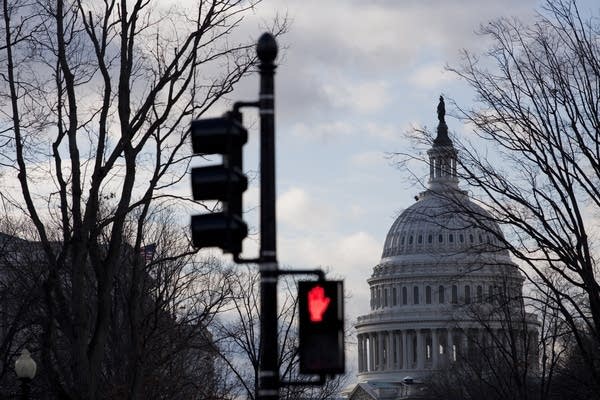Federal employees are first to feel sequester's effects
Go Deeper.
Create an account or log in to save stories.
Like this?
Thanks for liking this story! We have added it to a list of your favorite stories.

Federal workers in Minnesota are beginning to find out just how deeply across the board federal budget cuts will affect their agencies.
The federal government is the third-largest employer in Minnesota after the state government and the Mayo Clinic.
A large portion of those employees, close to 8,000, won't be affected by the cuts because they work for the Department of Veterans Affairs or the Social Security Administration. Both agencies were spared from sequestration.
For some, the cuts will mean putting off family visits and major purchases.
Turn Up Your Support
MPR News helps you turn down the noise and build shared understanding. Turn up your support for this public resource and keep trusted journalism accessible to all.
"We have three daughters, adult daughters, and none of them live here and absolutely we're postponing travel to see them until we see what's going on," said Florence Brammer, who has worked as a trial attorney for the National Labor Relations Board in Minneapolis for 30 years.
Furloughs in Brammer's agency could begin as soon as the end of this month. She and her colleagues were warned that they may have to take as many as 22 days off between then and Sept. 30.
That would mean losing more than one month's pay at a time when her husband is between jobs and the number of trials she has to argue remains the same.
"I'm not going to say, 'I'm only getting paid three days this week so I'm only doing three-fifths preparation,'"
Brammer expects to keep working just as hard, even as her paycheck shrinks.
"I'm not going to say, 'I'm only getting paid three days this week so I'm only doing three-fifths preparation,'" Brammer said.
Brammer emphasized that she was speaking for herself and not on behalf of the agency.
Wayne Pulford is an electronic technician at the Federal Correctional Institute in Sandstone, and along with other Bureau of Prisons employees he faces up to 14 days off unpaid as a result of the cuts which will make scheduling guard shifts very difficult, Pulford said.
"What's going to happen is that I'm not going to be doing my job working on the cameras, the security systems, the fire alarms," Pulford said. "I'm going to be working the unit."
As for losing almost three weeks of pay, Pulford says he is putting off big purchases and watching his spending.
But he says his $74,000 annual salary makes him better off than most of his colleagues, many of whom earn between $40,000 and $50,000 a year.
"You know, I'll be honest. I'm not so bad off. But we have staff members who are living paycheck to paycheck," Pulford said. "Losing 10 percent or 20 percent is really going to hurt them."

Here in Washington, lawmakers are making no effort to undo the cuts.
On Wednesday the Republican-led House did pass legislation allowing the Defense Department and a few law enforcement agencies to shift money around instead of cutting across the board. Second District Rep. John Kline, a Republican, said the cuts are not going away.
"I don't know anybody actually who is defending the sequestration process because of the way it takes cuts," Kline said. "I think the size of the cuts are easily manageable."
First District Democratic Rep. Tim Walz would like to see other federal agencies also get more flexibility to move money around.
It's likely the Democratic-controlled Senate will vote soon on a bill that gives them that flexibility. Walz said that after several years of increasingly tight budgets, Congress is sending a bad message to civil servants.
"When they're working as hard as ever and protecting us at the federal prison in Rochester and yet we tell them their job's not valuable," Walz said.
That's exactly how Brammer and Pulford feel.
Brammer said employees at the NLRB are very frugal with taxpayer money. She said they pay out of their own pocket for the water cooler and coffee they drink at the office. Pulford said that before joining the Bureau of Prisons, he spent nine years in the Air Force and that many of his colleagues are also veterans.
"I'm still serving my country in a law enforcement area, not in the military anymore, and this is how Congress is repaying my service," Pulford said. "Cutting my paycheck and telling me I get paid too much. It makes no sense."
Still, President Barack Obama and most congressional Democrats have all but conceded that these cuts will stay in place through the rest of the year.
It's unclear whether the cuts will continue next year and into the future as they're currently scheduled to.
This story was produced with the help of the Public Insight Network. Visit MPRNews.org to become a source for Minnesota Public Radio.




